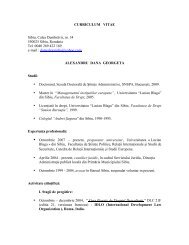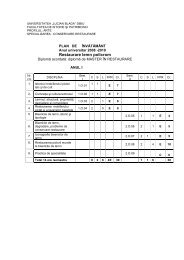Download - Facultatea de Științe Socio-Umane - Universitatea ...
Download - Facultatea de Științe Socio-Umane - Universitatea ...
Download - Facultatea de Științe Socio-Umane - Universitatea ...
Create successful ePaper yourself
Turn your PDF publications into a flip-book with our unique Google optimized e-Paper software.
Military Justice, Regulations and Discipline in<br />
Early Mo<strong>de</strong>rn Transylvanian Armies (XVI-XVII Century)<br />
Florin Nicolae ARDELEAN *<br />
Keywords: Transylvania, Middle Ages, military organization, army, military camp<br />
Abstract<br />
In the early mo<strong>de</strong>rn period the military organization of European states suffered<br />
significant changes, some of them regarding the internal regulations of armies. The<br />
state tried to impose a more efficient control on armies by issuing regulations on<br />
matters of: discipline, maintaining security in military camps, organizing the marches,<br />
provisioning and last but not least reducing the negative impact on civil population.<br />
This ten<strong>de</strong>ncy was also manifesting in the principality of Transylvania, a state with a<br />
rather short period of existence coinciding with this period of transition towards<br />
mo<strong>de</strong>rnity (1541-1691). Regulations such as those issued by Steven Báthory or those<br />
from the second half of the XVII century, together with occasional articles issued by the<br />
estate assemblies tried to impose measures of internal organization meant to increase<br />
the control of the prince on the military structures of the country.<br />
In the early mo<strong>de</strong>rn period armies became an efficient instrument of central<br />
authorities, contributing to the <strong>de</strong>velopment of absolute monarchies. Decreasing the<br />
power of privileged estates and their representative political institutions (estate<br />
assemblies) was a process that also involved aspects regarding military organization.<br />
The shift of power from estates to monarch, in the matter of military authority,<br />
affected the inner organization of armies during the XVI-XVII centuries. During this<br />
period, a general ten<strong>de</strong>ncy of increasing the control of the state over armies can be<br />
perceived throughout Europe, with specific <strong>de</strong>velopments for each region of the<br />
continent.<br />
Early mo<strong>de</strong>rn monarchs were preoccupied, more than their medieval pre<strong>de</strong>cessors,<br />
with imposing military regulations in or<strong>de</strong>r to improve their control over the armies<br />
mobilized to pursue their political objectives and ambitions. These internal<br />
regulations were also <strong>de</strong>termined by innovations in tactics, weapon technology and<br />
other aspects that changed the nature of warfare during the early mo<strong>de</strong>rn age. An<br />
increase in the number of soldiers, the longer duration of military campaigns, and a<br />
new tactical approach due to the spreading of fire arms (volley fire and<br />
countermarch) 1 required rigorous rules and regulations in or<strong>de</strong>r to maintain discipline,<br />
both on the battlefield and in military camps.<br />
* Babeş-Bolyai University Cluj-Napoca and Romanian Aca<strong>de</strong>my, Cluj branch<br />
(florinar<strong>de</strong>lean1@yahoo.com).<br />
1 Geoffrey Parker, The Limits to Revolutions in Military Afairs: Maurice of Nassau, The Battle of<br />
Nieuwpoort (1600), and the Legacy, în „The Journal of Military History”, nr. 71, 2007, p. 337-338.<br />
Studia Universitas Cibiniensis, Series Historica, Supplementum No. 1, p. 183-189





